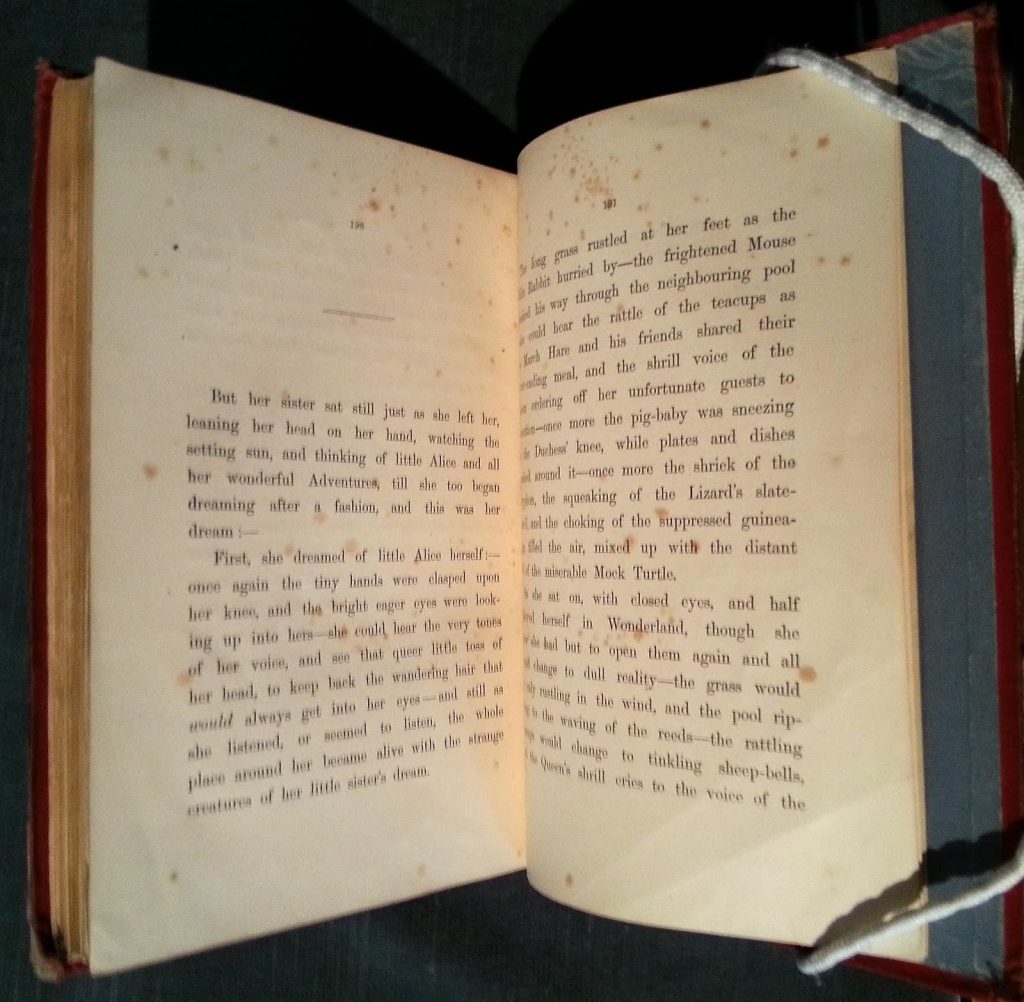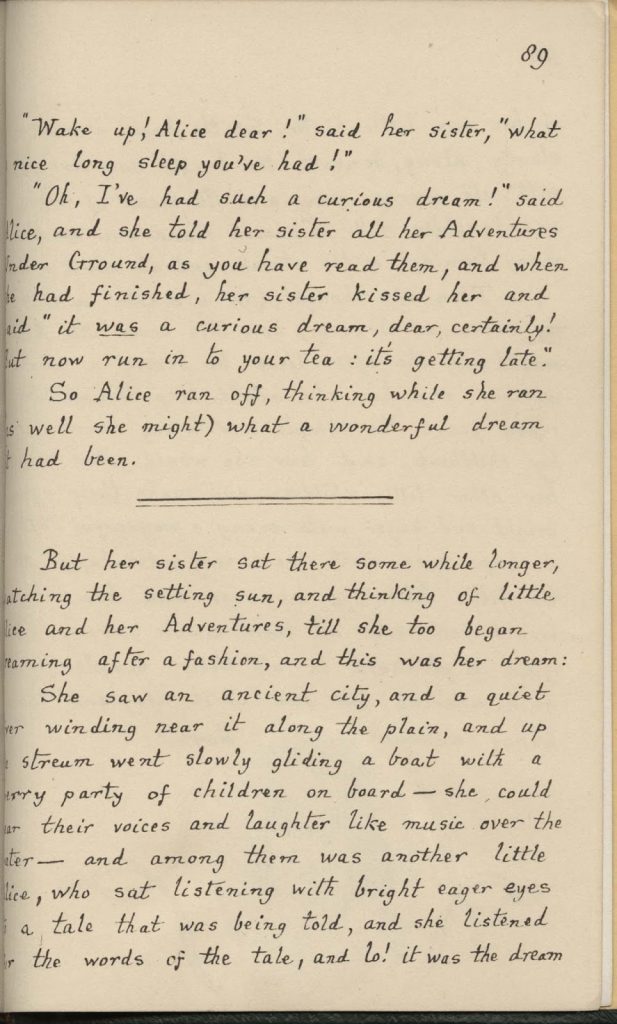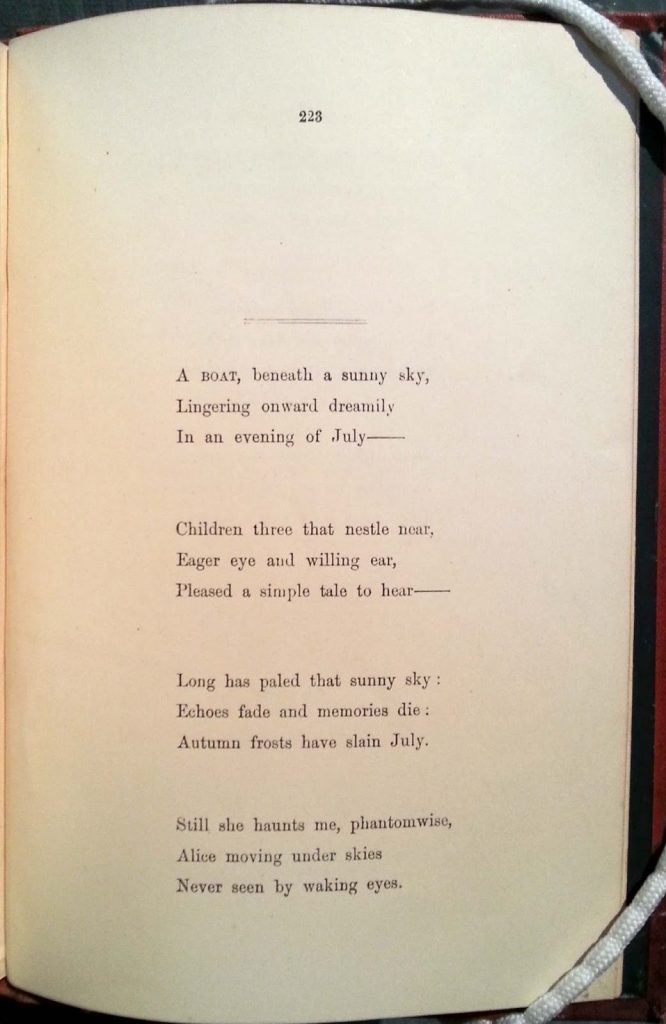There’s only a little over a week left to see our exhibits Down the Rabbit Hole: Celebrating 150 years of Alice in Wonderland and Through the Camera Lens: the Photograph of Charles Dodgson, so if you haven’t seen them, or if you’ve been meaning to see them again, come on by before they close on May 15th! We’ve scheduled two great programs to round out the Alice festivities: From Wonderland to the Phantom Tollbooth with consulting curator Leonard Marcus and author Norton Juster on Thursday, May 12 and a Carroll Hands-on Tour on Sunday, May 15.

copy 3. Rosenbach of the Free Library of Philadelphia.
As we think about endings, the ending of Alice in Wonderland itself foreshadows the hold on the imagination that the story would have and its remarkable staying power. It concludes with Alice waking up and realizing that her experience of Wonderland was “a curious dream!”. But she then goes on to tell her older sister “all these strange Adventures” that had happened in her dream of Wonderland. Then the book closes with the musings of the sister:
But her sister sat still just as she left her, leaning her head on her hand, watching the setting sun, and thinking of little Alice and all her wonderful Adventures, till she too began dreaming after a fashion, and this was her dream:—
First, she dreamed of little Alice herself, and once again the tiny hands were clasped upon her knee, and the bright eager eyes were looking up into hers—she could hear the very tones of her voice, and see that queer little toss of her head to keep back the wandering hair that would always get into her eyes—and still as she listened, or seemed to listen, the whole place around her became alive with the strange creatures of her little sister’s dream.
The long grass rustled at her feet as the White Rabbit hurried by—the frightened Mouse splashed his way through the neighbouring pool—she could hear the rattle of the teacups as the March Hare and his friends shared their never-ending meal, and the shrill voice of the Queen ordering off her unfortunate guests to execution—once more the pig-baby was sneezing on the Duchess’s knee, while plates and dishes crashed around it—once more the shriek of the Gryphon, the squeaking of the Lizard’s slate-pencil, and the choking of the suppressed guinea-pigs, filled the air, mixed up with the distant sobs of the miserable Mock Turtle.
So she sat on, with closed eyes, and half believed herself in Wonderland, though she knew she had but to open them again, and all would change to dull reality—the grass would be only rustling in the wind, and the pool rippling to the waving of the reeds—the rattling teacups would change to tinkling sheep-bells, and the Queen’s shrill cries to the voice of the shepherd boy—and the sneeze of the baby, the shriek of the Gryphon, and all the other queer noises, would change (she knew) to the confused clamour of the busy farm-yard—while the lowing of the cattle in the distance would take the place of the Mock Turtle’s heavy sobs.
Lastly, she pictured to herself how this same little sister of hers would, in the after-time, be herself a grown woman; and how she would keep, through all her riper years, the simple and loving heart of her childhood: and how she would gather about her other little children, and make their eyes bright and eager with many a strange tale, perhaps even with the dream of Wonderland of long ago: and how she would feel with all their simple sorrows, and find a pleasure in all their simple joys, remembering her own child-life, and the happy summer days.

She saw an ancient city, and a quiet river winding near it along the plain, and up the stream went slowly gliding a boat with a merry party of children on board—she could hear their voices and laughter like music over the water—and among them was another little Alice, who sat listening with bright eager eyes to a tale that was being told, and she listened for the words of the tale, and lo! it was the dream of her own little sister. So the boat wound slowly along, beneath the bright summer-day, with its merry crew and its music of voices and laughter, till it passed round one of the many turnings of the stream, and she saw it no more.
Then she thought, (in a dream within the dream, as it were,) how this same little Alice would, in the after-time, be herself a grown woman: and how she would keep, through her riper years, the simple and loving heart of her childhood: and how she would gather around her other little children, and make their eyes bright and eager with many a wonderful tale, perhaps even with these very adventures of the little Alice of long-ago: and how she would feel with all their simple sorrows, and find a pleasure in all their simple joys, remembering her own child-life, and the happy summer days.

A boat beneath a sunny sky,
Lingering onward dreamily
In an evening of July —Children three that nestle near,
Eager eye and willing ear,
Pleased a simple tale to hear —Long had paled that sunny sky:
Echoes fade and memories die.
Autumn frosts have slain July.Still she haunts me, phantomwise,
Alice moving under skies
Never seen by waking eyes.Children yet, the tale to hear,
Eager eye and willing ear,
Lovingly shall nestle near.In a Wonderland they lie,
Dreaming as the days go by,
Dreaming as the summers die:Ever drifting down the stream —
Lingering in the golden gleam —
Life, what is it but a dream?
In keeping Dodgson’s love of wordplay, the initial letters of the poem’s lines are an acrostic spelling out the name “Alice Pleasance Liddell.”
So this brings me to the end of this post about endings. Come see us before the end of our Alice exhibitions and stay tuned for the beginnings of some fascinating new projects and exhibitions.
She saw an ancient city, and a quiet river winding near it along the plain, and up the stream went slowly gliding a boat with a merry party of children on board-she could hear their voices and laughter like music over the water-and among them was another little Alice, who sat listening with bright eager eyes to a tale that was being told, and she listened for the words of the tale, and lo! it was the dream
